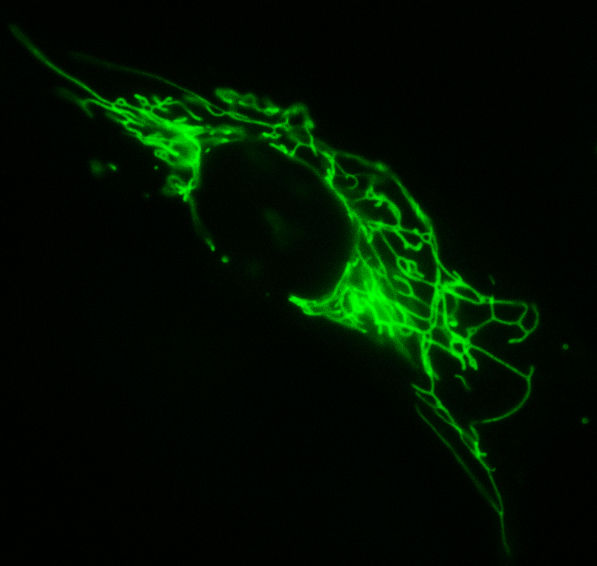A signal to survive: How the Parkin enzyme inhibits neuronal cell death
The Michael J. Fox Foundation supports new project at the RUB
Advertisement
Cell biologists at the Ruhr-Universität Bochum (RUB) have launched a new project to unravel the role of the enzyme Parkin in promoting neuronal survival. The team of Prof Dr Konstanze F. Winklhofer from the Institute of Physiological Chemistry, Department of Molecular Cell Biology, is looking for new therapeutic options to treat Parkinson's disease. The Michael J. Fox Foundation finances this research project with 125,000 US Dollars

Powerhouses of the cell: Mitochondria – here coloured in green – are the powerhouses of the cell. When they are damaged, the Parkin enzyme can activate a signal pathway that inhibits neuronal death.
© RUB: Müller-Rischart
Parkin activates a signal pathway that protects neurons
Parkinson's disease is characterized by the degeneration of neurons that produce the neurotransmitter dopamine. In some cases, mutations in the Parkin gene are the underlying cause of this disease. The RUB researchers have recently discovered that Parkin regulates a signal pathway that protects neurons under cellular stress from damage. When the integrity of mitochondria, the cell's powerhouses, is impaired, Parkin is recruited to a protein complex called LUBAC (linear ubiquitin chain assembly complex) and increases its activity. A signal pathway is then activated that leads to the increased expression of protective factors, thus preventing cell death. The RUB team investigates the molecular mechanism of how parkin activates LUBAC and which other regulators play a role in this process. The goal of the project is to identify novel targets to halt or delay the neurodegenerative process in Parkinson's disease.
Most read news
Other news from the department science

Get the life science industry in your inbox
By submitting this form you agree that LUMITOS AG will send you the newsletter(s) selected above by email. Your data will not be passed on to third parties. Your data will be stored and processed in accordance with our data protection regulations. LUMITOS may contact you by email for the purpose of advertising or market and opinion surveys. You can revoke your consent at any time without giving reasons to LUMITOS AG, Ernst-Augustin-Str. 2, 12489 Berlin, Germany or by e-mail at revoke@lumitos.com with effect for the future. In addition, each email contains a link to unsubscribe from the corresponding newsletter.



























































